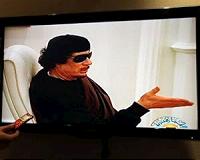| . |  |
. |
Ramallah, Palestinian Territories (AFP) May 25, 2011 The Palestinians vowed on Wednesday to push ahead with plans to seek UN backing as long as talks are off the agenda, prompting Barack Obama to warn it would be a "mistake." "I strongly believe for the Palestinians to take the United Nations route rather than the path of sitting down and talking with the Israelis is a mistake," Obama said in London at a joint news conference with British Prime Minister David Cameron. Since the collapse of direct peace talks late last year, the Palestinian leadership has been pursuing a strategy aimed at securing UN recognition of their promised state on 1967 borders, drawing sharp criticism from Israel and Washington. "The only way we are going to see a Palestinian state is if Israelis and Palestinians agree on a just peace," Obama said, warning that peace would only work if both sides agreed to a "wrenching compromise." Obama's remarks came after a week of high-level debate on the Israeli-Palestinian conflict which has left the prospects of a revival of peace talks more remote than ever. Earlier on Wednesday, president Mahmud Abbas warned unless there was a fresh round of peace negotiations, the Palestinians would head to the UN in September in the hope of being accepted as a full member of the world body. "Our first choice is negotiations but if there is no progress before September, we will go to the United Nations," he said in remarks which came a day after Netanyahu had outlined his views on a peace deal with the Palestinians in a speech to the US Congress. In his address, Netanyahu repeated a litany of well-known Israeli demands of the Palestinians but broke no new political ground and offered no incentives to break the deadlock in peace talks. "Prime Minister Netanyahu's speech... contained many errors and distortions and was a long way from the peace process," Abbas told reporters at the start of a meeting of the Palestine Liberation Organisation (PLO) executive committee in the West Bank town of Ramallah. Tayeb Abdelrahim, Abbas's chief of staff, said that Netanyahu's reception in Washington showed bias on the part of US lawmakers. "The greeting given to the Israeli prime minister by the American Congress, where he was applauded more than 25 times, made us feel the complete partiality of Congress toward the Israeli prime minister who compromised all the foundations of a just peace in the region," he said in a statement. "If George Washington or Abraham Lincoln were to return from the dead, they would not get such a welcome," he added. Netanyahu said he was willing to make "painful compromises" for peace if the Palestinians would recognise Israel as a Jewish state but he ruled out a division of Jerusalem, any return of Palestinian refugees or any pullback to 1967 borders. "There is very strong US support for the principles that we are defending, above all recognition of Israel as the nation state of the Jewish people, the need for borders that can be defended and the complete rejection of Hamas," Netanyahu said on his return home. "I presented to the United States a broad set of proposals that is grounded on a very wide consensus in Israel." In a key policy speech last week, Obama said the territorial lines in place before the 1967 Six Day War, combined with land swaps, should be the basis for talks on a peace deal with the Palestinians. The idea was rejected out of hand by Netanyahu but hailed by the Palestinians, with senior PLO official Yasser Abed Rabbo on Wednesday urging the UN Security Council and the Quartet of Middle East peacemakers to formally adopt the US president's proposals. Reading out a statement at the end of the PLO meeting, Abed Rabbo said the leadership wanted the two bodies to "lay out a mechanism and a timeframe... to implement Obama's ideas in accordance with all the Arab and international references to launch a serious peace process." The collapse of peace talks meant the Palestinians were compelled to examine the option of approaching the United Nations as a route to statehood, he said. "The Palestinian leadership affirms its choice for negotiations but the fact that the door to the peace process is closed will force it to consider all other options, including going to the Security Council or the General Assembly in September." Peace talks between Israel and the Palestinians have been on hold since September 2010, when they ground to a halt over the issue of Israeli settlement construction, just weeks after they were relaunched in Washington.
Share This Article With Planet Earth
Related Links
 Kadhafi cut off from troops: Canadian general
Kadhafi cut off from troops: Canadian generalOttawa (AFP) May 25, 2011 NATO air strikes have forced Libyan strongman Moamer Kadhafi into hiding, making it increasingly difficult for him to communicate with his troops, a Canadian general said Wednesday. "We now realize that Kadhafi is forced to hide (from NATO air strikes) and so it's become more and more difficult for him to communicate with his troops and to order attacks on civilians," Brigadier-General Richa ... read more |
|
| The content herein, unless otherwise known to be public domain, are Copyright 1995-2010 - SpaceDaily. AFP and UPI Wire Stories are copyright Agence France-Presse and United Press International. ESA Portal Reports are copyright European Space Agency. All NASA sourced material is public domain. Additional copyrights may apply in whole or part to other bona fide parties. Advertising does not imply endorsement,agreement or approval of any opinions, statements or information provided by SpaceDaily on any Web page published or hosted by SpaceDaily. Privacy Statement |